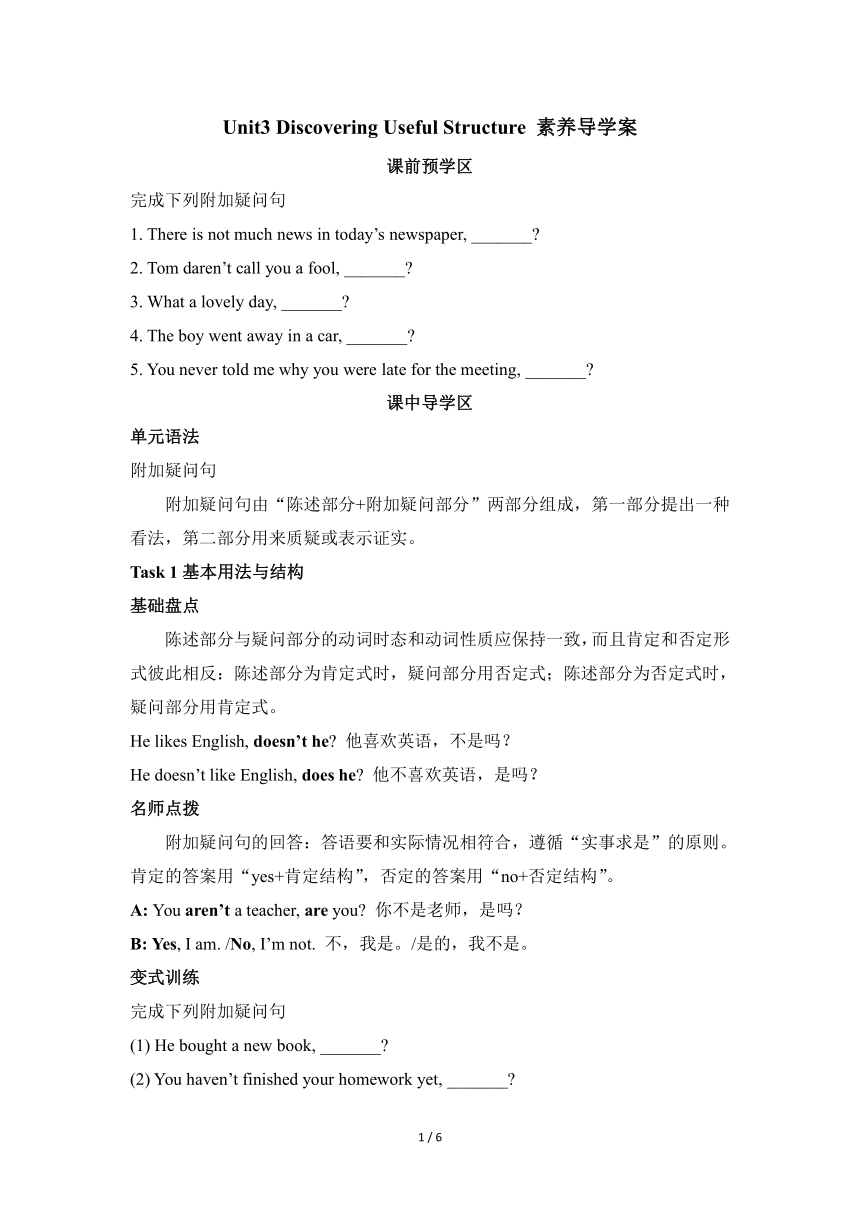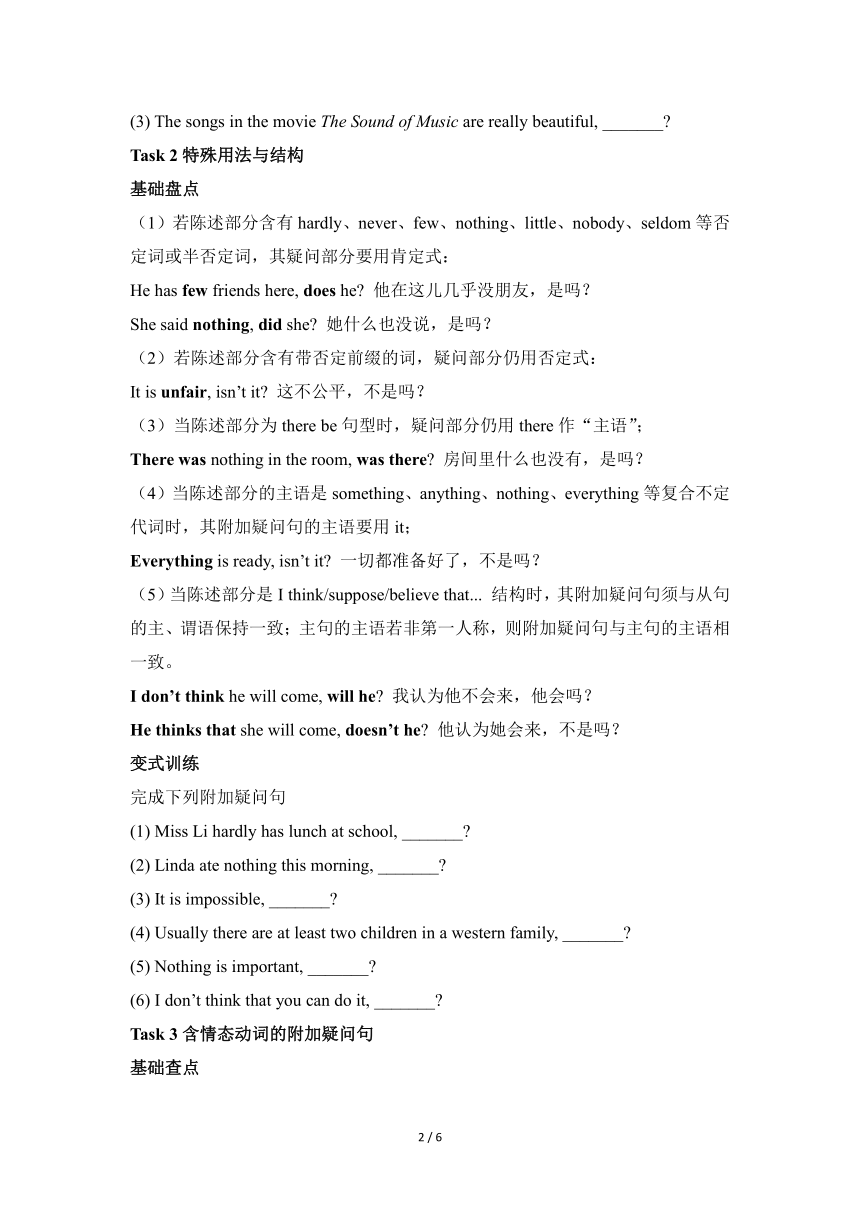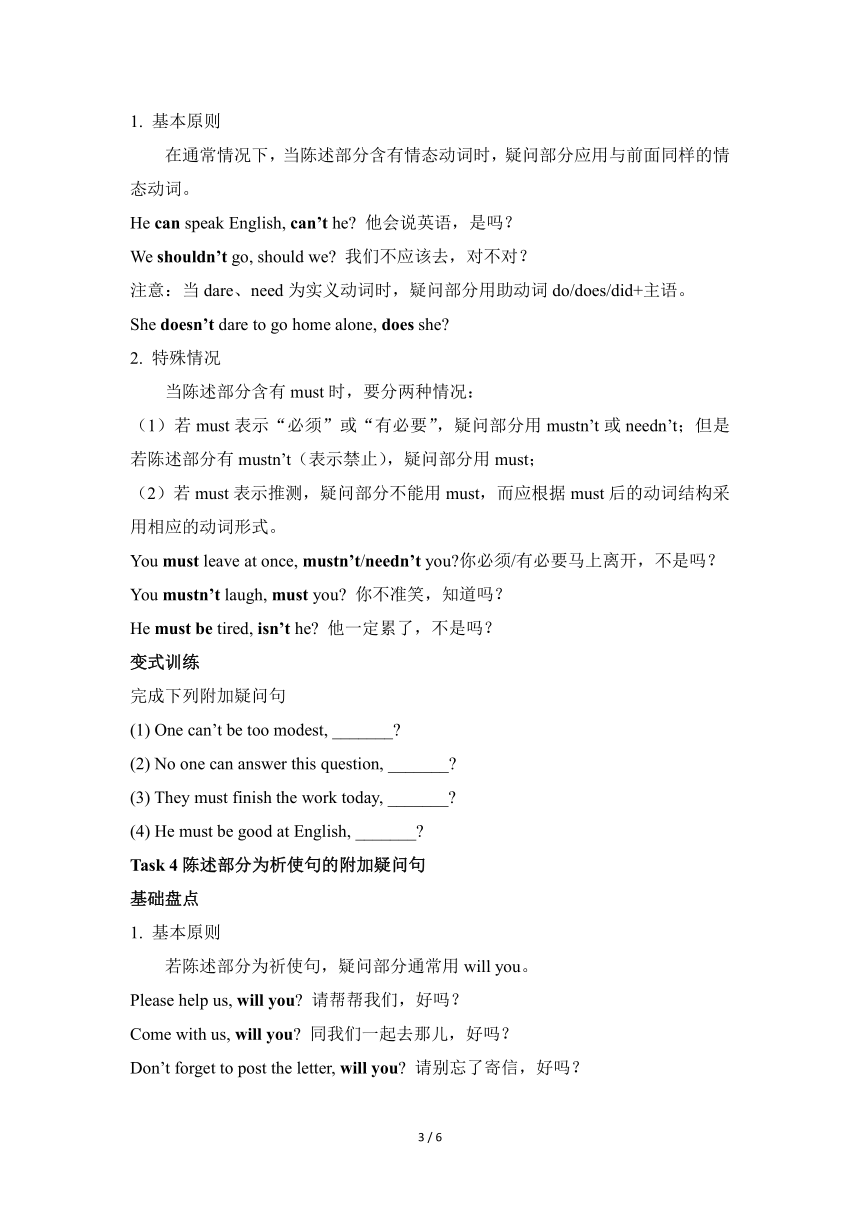人教版(2019)必修 第一册Unit 3 Sports and fitness Discovering Useful Structure 素养导学案(含答案)
文档属性
| 名称 | 人教版(2019)必修 第一册Unit 3 Sports and fitness Discovering Useful Structure 素养导学案(含答案) |  | |
| 格式 | docx | ||
| 文件大小 | 25.9KB | ||
| 资源类型 | 教案 | ||
| 版本资源 | 人教版(2019) | ||
| 科目 | 英语 | ||
| 更新时间 | 2023-03-08 16:50:34 | ||
图片预览



文档简介
Unit3 Discovering Useful Structure 素养导学案
课前预学区
完成下列附加疑问句
1. There is not much news in today’s newspaper, _______
2. Tom daren’t call you a fool, _______
3. What a lovely day, _______
4. The boy went away in a car, _______
5. You never told me why you were late for the meeting, _______
课中导学区
单元语法
附加疑问句
附加疑问句由“陈述部分+附加疑问部分”两部分组成,第一部分提出一种看法,第二部分用来质疑或表示证实。
Task 1基本用法与结构
基础盘点
陈述部分与疑问部分的动词时态和动词性质应保持一致,而且肯定和否定形式彼此相反:陈述部分为肯定式时,疑问部分用否定式;陈述部分为否定式时,疑问部分用肯定式。
He likes English, doesn’t he 他喜欢英语,不是吗?
He doesn’t like English, does he 他不喜欢英语,是吗?
名师点拨
附加疑问句的回答:答语要和实际情况相符合,遵循“实事求是”的原则。肯定的答案用“yes+肯定结构”,否定的答案用“no+否定结构”。
A: You aren’t a teacher, are you 你不是老师,是吗?
B: Yes, I am. /No, I’m not. 不,我是。/是的,我不是。
变式训练
完成下列附加疑问句
(1) He bought a new book, _______
(2) You haven’t finished your homework yet, _______
(3) The songs in the movie The Sound of Music are really beautiful, _______
Task 2特殊用法与结构
基础盘点
(1)若陈述部分含有hardly、never、few、nothing、little、nobody、seldom等否定词或半否定词,其疑问部分要用肯定式:
He has few friends here, does he 他在这儿几乎没朋友,是吗?
She said nothing, did she 她什么也没说,是吗?
(2)若陈述部分含有带否定前缀的词,疑问部分仍用否定式:
It is unfair, isn’t it 这不公平,不是吗?
(3)当陈述部分为there be句型时,疑问部分仍用there作“主语”;
There was nothing in the room, was there 房间里什么也没有,是吗?
(4)当陈述部分的主语是something、anything、nothing、everything等复合不定代词时,其附加疑问句的主语要用it;
Everything is ready, isn’t it 一切都准备好了,不是吗?
(5)当陈述部分是I think/suppose/believe that... 结构时,其附加疑问句须与从句的主、谓语保持一致;主句的主语若非第一人称,则附加疑问句与主句的主语相一致。
I don’t think he will come, will he 我认为他不会来,他会吗?
He thinks that she will come, doesn’t he 他认为她会来,不是吗?
变式训练
完成下列附加疑问句
(1) Miss Li hardly has lunch at school, _______
(2) Linda ate nothing this morning, _______
(3) It is impossible, _______
(4) Usually there are at least two children in a western family, _______
(5) Nothing is important, _______
(6) I don’t think that you can do it, _______
Task 3含情态动词的附加疑问句
基础查点
1. 基本原则
在通常情况下,当陈述部分含有情态动词时,疑问部分应用与前面同样的情态动词。
He can speak English, can’t he 他会说英语,是吗?
We shouldn’t go, should we 我们不应该去,对不对?
注意:当dare、need为实义动词时,疑问部分用助动词do/does/did+主语。
She doesn’t dare to go home alone, does she
2. 特殊情况
当陈述部分含有must时,要分两种情况:
(1)若must表示“必须”或“有必要”,疑问部分用mustn’t或needn’t;但是若陈述部分有mustn’t(表示禁止),疑问部分用must;
(2)若must表示推测,疑问部分不能用must,而应根据must后的动词结构采用相应的动词形式。
You must leave at once, mustn’t/needn’t you 你必须/有必要马上离开,不是吗?
You mustn’t laugh, must you 你不准笑,知道吗?
He must be tired, isn’t he 他一定累了,不是吗?
变式训练
完成下列附加疑问句
(1) One can’t be too modest, _______
(2) No one can answer this question, _______
(3) They must finish the work today, _______
(4) He must be good at English, _______
Task 4陈述部分为析使句的附加疑问句
基础盘点
1. 基本原则
若陈述部分为祈使句,疑问部分通常用will you。
Please help us, will you 请帮帮我们,好吗?
Come with us, will you 同我们一起去那儿,好吗?
Don’t forget to post the letter, will you 请别忘了寄信,好吗?
2. 特殊情况
(1) 当祈使句为Let’s... 时,疑问部分用shall we。
(2) 当祈使句为Let us... 时,表示请求,疑问部分用will you.
Let’s go there together, shall we 我们一起去,好吗?
Let us know your address, will you 请把你的地址告诉我们,好吗?
变式训练
完成下列附加疑问句
(1) Ellen, please pass me the salt, _______
(2) Don’t draw on the wall,_______
(3) Let’s have fun on the playground, _______
(4) Let us help you clean the room, _______
课堂思学区
夯实基础
I. 完成下列附加疑问句
1. Your aunt could hardly recognize you, _______
2. Somebody’s forgotten their coats, _______
3. Bob said he would telephone us, _______
4. You are so tired. You’d better have a rest, _______
5. Mr Johnson must have arrived by subway, _______
6. Don’t forget to close the windows when you leave the room, _______
7. I don’t believe they can pass the driving test, _______
78. Let me help you with your English study, _______
9. There won’t be any meetings this evening, _______
10. Pass me the newspaper, _______
Ⅱ. 仔细体会文章语境,完成下列附加疑问句
Tim: Hi, Susan. I’ve been wondering when I’d run into you. What are you busy with
Susan: Nice to meet you here, Tim. I’m buying some Christmas gifts for those who work with me, but it’s really a headache, 1. _______
Tim: Maybe I could give you some advice. Firstly, you should consider dividing them into different groups, 2. _______ Who are the people that are your friends as well as your workmates and who are the people you do not know well but see pretty much daily
Susan: OK, then what should I do
Tim: For the friends, you can buy them personal gifts, chocolate, for example.
Susan: This is what I always give, but I know one of my friends, Mary, is on a diet, 3. _______
Tim: Does she like fruit or coffee Anyway, consider the gift that you know your friend likes, will you
Susan: Well, I think fruit is helpful to keep healthy, 4. _______ What about others
Tim: You can send them cards.
Susan: Christmas cards
Tim: Yes, you can afford them. More importantly, it reminds them that you’re thinking of them, 5. _______
Susan: Thank you for your suggestions, Tim. You have helped me out, 6. _______
参考答案
课前预学区
1. is there 2. dare he 3. isn’t it 4. didn’t he 5. did you
课中导学区
Task 1
变式训练(l) didn’t he (2) have you (3) aren’t they
Task 2
变式训练(1) does she (2) did she (3) isn’t it
(4) aren’t there (5) is it (6) can you
Task 3
变式训练(1) can one (2) can they (3) needn’t/mustn’t they (4) isn’t he
Task 4
变式训练(1) will you (2) will you (3) shall we (4) will you
课堂思学区
夯实基础
I. 1. could she 2. haven’t they 3. didn’t he 4. hadn’t you 5. hasn’t he
6. will you 7. can they 8. will you 9. will there 10. will you
II. 1. isn’t it 2. shouldn’t you 3. isn’t she
4. isn’t it 5. doesn’t it 6. haven’t you
课前预学区
完成下列附加疑问句
1. There is not much news in today’s newspaper, _______
2. Tom daren’t call you a fool, _______
3. What a lovely day, _______
4. The boy went away in a car, _______
5. You never told me why you were late for the meeting, _______
课中导学区
单元语法
附加疑问句
附加疑问句由“陈述部分+附加疑问部分”两部分组成,第一部分提出一种看法,第二部分用来质疑或表示证实。
Task 1基本用法与结构
基础盘点
陈述部分与疑问部分的动词时态和动词性质应保持一致,而且肯定和否定形式彼此相反:陈述部分为肯定式时,疑问部分用否定式;陈述部分为否定式时,疑问部分用肯定式。
He likes English, doesn’t he 他喜欢英语,不是吗?
He doesn’t like English, does he 他不喜欢英语,是吗?
名师点拨
附加疑问句的回答:答语要和实际情况相符合,遵循“实事求是”的原则。肯定的答案用“yes+肯定结构”,否定的答案用“no+否定结构”。
A: You aren’t a teacher, are you 你不是老师,是吗?
B: Yes, I am. /No, I’m not. 不,我是。/是的,我不是。
变式训练
完成下列附加疑问句
(1) He bought a new book, _______
(2) You haven’t finished your homework yet, _______
(3) The songs in the movie The Sound of Music are really beautiful, _______
Task 2特殊用法与结构
基础盘点
(1)若陈述部分含有hardly、never、few、nothing、little、nobody、seldom等否定词或半否定词,其疑问部分要用肯定式:
He has few friends here, does he 他在这儿几乎没朋友,是吗?
She said nothing, did she 她什么也没说,是吗?
(2)若陈述部分含有带否定前缀的词,疑问部分仍用否定式:
It is unfair, isn’t it 这不公平,不是吗?
(3)当陈述部分为there be句型时,疑问部分仍用there作“主语”;
There was nothing in the room, was there 房间里什么也没有,是吗?
(4)当陈述部分的主语是something、anything、nothing、everything等复合不定代词时,其附加疑问句的主语要用it;
Everything is ready, isn’t it 一切都准备好了,不是吗?
(5)当陈述部分是I think/suppose/believe that... 结构时,其附加疑问句须与从句的主、谓语保持一致;主句的主语若非第一人称,则附加疑问句与主句的主语相一致。
I don’t think he will come, will he 我认为他不会来,他会吗?
He thinks that she will come, doesn’t he 他认为她会来,不是吗?
变式训练
完成下列附加疑问句
(1) Miss Li hardly has lunch at school, _______
(2) Linda ate nothing this morning, _______
(3) It is impossible, _______
(4) Usually there are at least two children in a western family, _______
(5) Nothing is important, _______
(6) I don’t think that you can do it, _______
Task 3含情态动词的附加疑问句
基础查点
1. 基本原则
在通常情况下,当陈述部分含有情态动词时,疑问部分应用与前面同样的情态动词。
He can speak English, can’t he 他会说英语,是吗?
We shouldn’t go, should we 我们不应该去,对不对?
注意:当dare、need为实义动词时,疑问部分用助动词do/does/did+主语。
She doesn’t dare to go home alone, does she
2. 特殊情况
当陈述部分含有must时,要分两种情况:
(1)若must表示“必须”或“有必要”,疑问部分用mustn’t或needn’t;但是若陈述部分有mustn’t(表示禁止),疑问部分用must;
(2)若must表示推测,疑问部分不能用must,而应根据must后的动词结构采用相应的动词形式。
You must leave at once, mustn’t/needn’t you 你必须/有必要马上离开,不是吗?
You mustn’t laugh, must you 你不准笑,知道吗?
He must be tired, isn’t he 他一定累了,不是吗?
变式训练
完成下列附加疑问句
(1) One can’t be too modest, _______
(2) No one can answer this question, _______
(3) They must finish the work today, _______
(4) He must be good at English, _______
Task 4陈述部分为析使句的附加疑问句
基础盘点
1. 基本原则
若陈述部分为祈使句,疑问部分通常用will you。
Please help us, will you 请帮帮我们,好吗?
Come with us, will you 同我们一起去那儿,好吗?
Don’t forget to post the letter, will you 请别忘了寄信,好吗?
2. 特殊情况
(1) 当祈使句为Let’s... 时,疑问部分用shall we。
(2) 当祈使句为Let us... 时,表示请求,疑问部分用will you.
Let’s go there together, shall we 我们一起去,好吗?
Let us know your address, will you 请把你的地址告诉我们,好吗?
变式训练
完成下列附加疑问句
(1) Ellen, please pass me the salt, _______
(2) Don’t draw on the wall,_______
(3) Let’s have fun on the playground, _______
(4) Let us help you clean the room, _______
课堂思学区
夯实基础
I. 完成下列附加疑问句
1. Your aunt could hardly recognize you, _______
2. Somebody’s forgotten their coats, _______
3. Bob said he would telephone us, _______
4. You are so tired. You’d better have a rest, _______
5. Mr Johnson must have arrived by subway, _______
6. Don’t forget to close the windows when you leave the room, _______
7. I don’t believe they can pass the driving test, _______
78. Let me help you with your English study, _______
9. There won’t be any meetings this evening, _______
10. Pass me the newspaper, _______
Ⅱ. 仔细体会文章语境,完成下列附加疑问句
Tim: Hi, Susan. I’ve been wondering when I’d run into you. What are you busy with
Susan: Nice to meet you here, Tim. I’m buying some Christmas gifts for those who work with me, but it’s really a headache, 1. _______
Tim: Maybe I could give you some advice. Firstly, you should consider dividing them into different groups, 2. _______ Who are the people that are your friends as well as your workmates and who are the people you do not know well but see pretty much daily
Susan: OK, then what should I do
Tim: For the friends, you can buy them personal gifts, chocolate, for example.
Susan: This is what I always give, but I know one of my friends, Mary, is on a diet, 3. _______
Tim: Does she like fruit or coffee Anyway, consider the gift that you know your friend likes, will you
Susan: Well, I think fruit is helpful to keep healthy, 4. _______ What about others
Tim: You can send them cards.
Susan: Christmas cards
Tim: Yes, you can afford them. More importantly, it reminds them that you’re thinking of them, 5. _______
Susan: Thank you for your suggestions, Tim. You have helped me out, 6. _______
参考答案
课前预学区
1. is there 2. dare he 3. isn’t it 4. didn’t he 5. did you
课中导学区
Task 1
变式训练(l) didn’t he (2) have you (3) aren’t they
Task 2
变式训练(1) does she (2) did she (3) isn’t it
(4) aren’t there (5) is it (6) can you
Task 3
变式训练(1) can one (2) can they (3) needn’t/mustn’t they (4) isn’t he
Task 4
变式训练(1) will you (2) will you (3) shall we (4) will you
课堂思学区
夯实基础
I. 1. could she 2. haven’t they 3. didn’t he 4. hadn’t you 5. hasn’t he
6. will you 7. can they 8. will you 9. will there 10. will you
II. 1. isn’t it 2. shouldn’t you 3. isn’t she
4. isn’t it 5. doesn’t it 6. haven’t you
